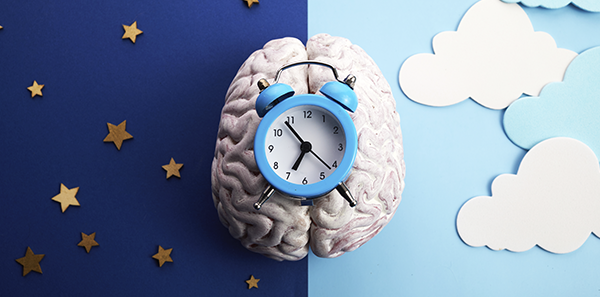
Did you know that your body and mind change according to the cycle of day and night? As a human being, you adapt to your environment and act accordingly depending on the variations in the environment and the changes that take place in it.
This phenomenon is called “circadian rhythms”, physical, mental and behavioural disturbances that follow the regular 24-hour cycle and respond mainly to light/dark changes.
But how do they work and why are they important?
Your body picks up environmental signals and processes them in your brain, in an area in the hypothalamus called the suprachiasmatic nucleus (SCN). This is where the mammalian biological clock, made up of 20,000 neurons, is located. The SCN’s activity is affected by external factors, such as food and mealtimes, environmental conditions, social interactions… but above all by light. After hitting the retina, it carries information to the SCN, and from there to the pineal gland, where melatonin, the hormone that controls sleep, is secreted.
In addition to affecting sleep patterns, it influences digestion, body temperature, hormone release, cell regeneration and brain activity. This is why its harmony is so important, as it affects all the functions and needs of your body.
Disruption in the order of these rhythms has a negative effect in both the short and long term. In the short term, this can cause jet lag, accompanied by symptoms of fatigue, disorientation and insomnia. It can also lead to psychological and neurological disorders, seasonal affective disorder, bipolar disorder, and affective sleep disorders, among others. In the long term it affects the fracture of the human body systems, especially the cardiovascular system, aggravating cardiovascular diseases, high blood pressure, etc.
How can you improve the body’s adaptation to circadian rhythms?
Some tips include:
- Exposure to morning sunlight.
- Exercise in the morning or early evening.
- Avoid caffeine because it alters cortisol and melatonin production.
- Eat dinner and lunch earlier to ensure proper metabolism of ingested nutrients and do not eat before bedtime.
- Take short naps, lasting less than 20 minutes and before 3pm.
- Avoid artificial light from electronic devices at least 1 hour before bedtime to avoid distractions and disruption of sleep rhythms.
- Do relaxing activities before going to bed, such as reading, meditating, listening to music, taking a hot shower, etc.
- Always go to bed at the same time.
- Sleep in the dark and in silence to avoid sleep fragmentation and to ensure sleep quality.
Maintaining adjusted circadian rhythms is essential for your health and well-being. This is why it is so important to understand them, to be aware of how they work and to regulate them for a better quality of life and sleep.












